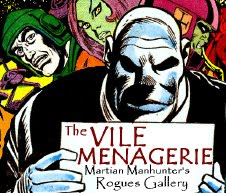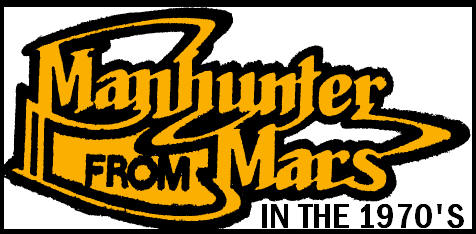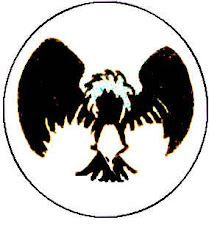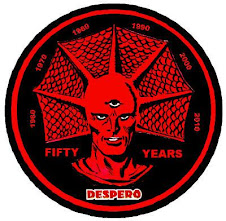 2016 Martian Manhunter - John Jones detective sketch card art by Brendon & Brian Fraim
2016 Martian Manhunter - John Jones detective sketch card art by Brendon & Brian FraimI had an odd and very minor dream last night wherein I was flipping through the Diamond Previews comic book ordering catalog. In the IDW section, there was a tiny image of J'Onn J'Onzz flying at the reader, and I vaguely recall it being connected to an Artist's Edition reproducing original pages from Justice League of America. When I woke up, I got to thinking that it might be a fun thought experience to consider whether Martian Manhunter had the sort of mobility to appear in such an ad. I'll try not to take too long, because he really doesn't, and the legal weeds are awfully tall in even considering it.
Beginning in the latter half of the 20th Century, a lot of Golden Age creators began challenging “work made for hire” contracts with early comics publishers based on their independent contractor status, and the general tendencies of everyone involved in the industry for having a poor understanding of copyright law. Basically, everybody was racing to cash in on a hot fad, paperwork was sloppy, and no one was taking a long view at the longevity and value of comic creations. Bob Kane has arguably been the most successful at these renegotiation encounters by quietly and cunningly making it worth National Periodical Publications wile to pay him off and afford him broad creative credit for the Batman franchise. Kane's rights claims provided DC Comics with a shield against other involved talents, since they would first have to go through Kane to get to DC, significantly muddying the legal waters. Considerably less successful have been the creators of Superman, who waged very public war against National for full ownership of the property quite early on, and have been met with numerous devastating defeats in the courtroom. However, there have been successes in that respect, as when Pete Morisi secured copyright on Peter Cannon: Thunderbolt, which was sold by Charlton to DC Comics in the 1980s without his consent or involvement. The two parties negotiated an amicable divorce of intellectual property, and Thunderbolt was most recently published by Dynamite Entertainment under a licensing agreement.

The creation and ongoing rights to J'onn J'onzz are unlike any of those cases, though. The concept of a Manhunter from Mars had already been developed a year before his creation by an entirely different creative team in another National title. The only individual involved with both incarnations was Jack Schiff, a National editor, and the premise appeared in a Batman comic story dutifully credited to the aforementioned Bob Kane. The Samachson Estate would have to overcome the burden of proof that J'onn J'onzz was not a derivative work of another National property developed by one of their employees and the studio of a listed creator they had a firm contract with. The best case scenario would be the estate securing credit to Joe Samachson for co-creation and some sort of royalty or stipend. Given that just such a credit began appearing in the 1990s contemporaneous to a bunch of these reversion/termination filings, it's possible a settlement of that sort already occurred.
Having established the realities and reasonable assumptions on the matter, I can now delve into wild, ridiculous speculation. Suppose, against all odds, at least some of the rights to J'onn J'onzz were wrested from DC Entertainment? Again, I have to stress that despite multimedia adaptations and a degree of name recognition, Martian Manhunter is of extremely modest value in general and especially when separated from the DC Universe. Most of his stories were unambiguously written by hired hands and have inextricable ties to DC property. There's a very good chance that DC would simultaneously control their version of J'onn J'onzz and jealously guard against any of their concepts turning up in a competing incarnation. Even if Joe Certa's estate were to piggyback onto copyright claims, there would be a whole other conflict over National employee Jack Miller's role in the overwhelming majority of solo J'onn J'onzz stories published before 1968. Ironically, National's ownership of Martian Manhunter is more solidly bedrock than over any of their big three trinity of iconic heroes. What would either of J'onn J'onzz's established creators gain from a separation?

Joe Samachson is the credited writer of "The Strange Experiment of Dr. Erdel," "The Case Of The Magic Baseball" and "The Man With 20 Lives." What do those stories give you to work with?
- The character of John Jones/J'onn J'onzz, though likely not the name "Manhunter from Mars" due to the earlier Batman story.
- A much more binary White Male John Jones / Green Male J'onn J'onzz, since variations on that model could be argued as derivative of DC stories, and you'd want the most recognizable version of the concept to exploit.
- Most of J'onn J'onzz's long established look and powers. In the Silver and Bronze Ages, J'onzz was much more limited in his abilities than the version we know today, which hews closer to the original conception.
- A strip likely called "J'onn J'onzz," since Edgar Rice Burroughs' people would probably take issue with "John Jones of Mars" being too similar to their more famous John Carter.
- Professor Mark Erdel and the Robot Brain. One of these concepts has been killed off before the end of the initial story, but a story engine could be developed around John Jones bringing things to Earth or transporting himself to other spheres through the power of the Robot Brain. More importantly was the notion of its reaching "other dimensions," a premise never explored in the later strips that opens up enormous options for classic sci-fi/fantasy "looking glass" scenarios across "space-- time-- or the fourth dimension!" Erdel could also serve a similar role as Professor Emil Jennings in T.H.U.N.D.E.R. Agents, leaving behind a treasure trove of gadgets that could fuel stories. He was after all a "world-famous scientist." For what, exactly?
- Emphasis on J'onn J'onzz as a scientist, an element almost immediately dropped in the Jack Miller stories. Proper deductive reason and the scientific method could be applied to stories in place of the logic leaps that came to define the DC strips.
- A greater sense of exploration. Reflecting Samachson's body of work outside comics, Jones could be more of a globetrotter and connoisseur of cultures. Why would he police one U.S. city indefinitely? Would he perhaps be more of an interventionist, stamping out corruption wherever he found it to aid his adoptive world toward its own Great Evolution? Unimpeded by a shared universe, he could topple governments and openly conflict with the mores of the western world? Or perhaps follow some variation on the Prime Directive, and vow only to work anonymously within the established framework of terrestrial customs?
- The de-emphasis of Mars itself, as the world was little explored in the early strips, and scientific progress has rendered assertions from those strips unlikely. Perhaps J'onzz comes from a far future Mars, or one from a parallel dimension? It may be best to stress his role as an extraterrestrial visitor over an implausible and trademark impacting Martian. Regardless, Mars is treated like a utopia in the first strip, which is a difficult thing to explore, and all paths to dystopia are well trod at DC.
- Lt. Saunders as an ongoing adversary. Saunders was John Jones' boss in the earliest stories, but was never well defined and swiftly replaced by Captain Harding. Jones needs a Lex Luthor more than he does a Perry White, plus Saunders comes off as rather oily in his debut. Maybe he finds some of Erdel's devices or gets exposed to some alien energy, or perhaps he's just a corrupt cop that stymies Jones' pursuit of justice without actually breaking the law himself?






























No comments:
Post a Comment